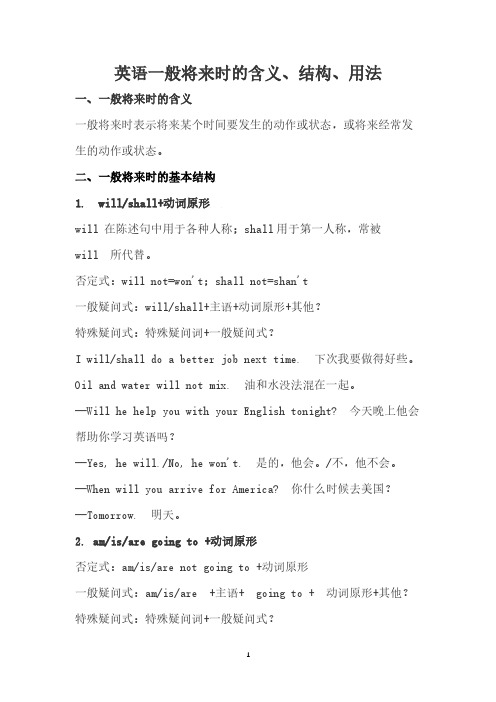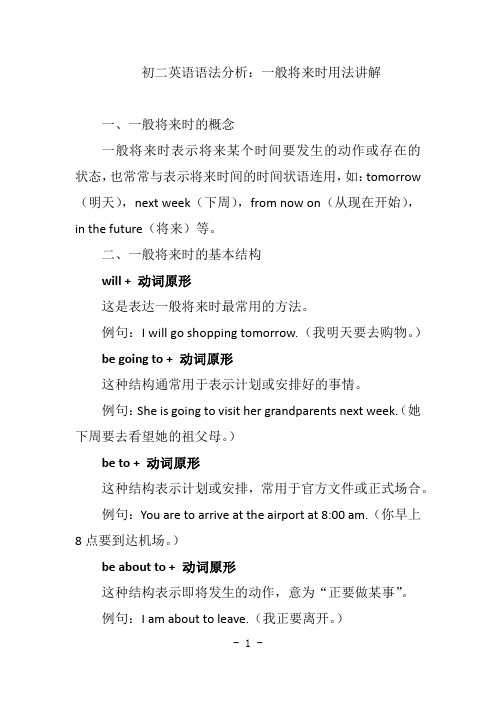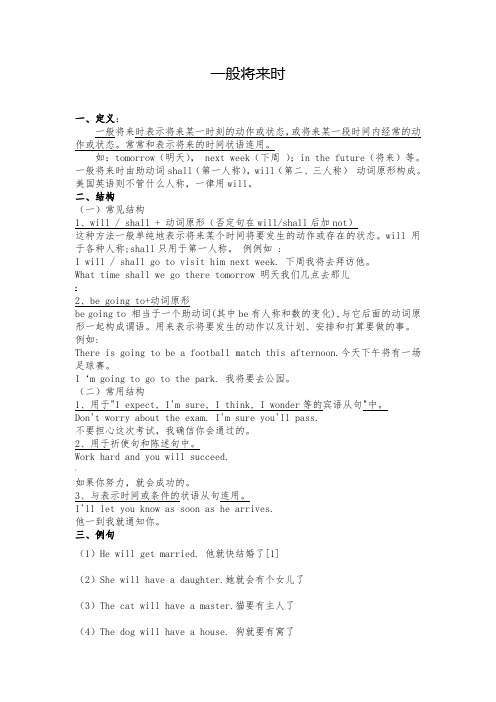一般将来时的基本结构
英语语法一般将来时的含义、结构、用法

英语一般将来时的含义、结构、用法一、一般将来时的含义一般将来时表示将来某个时间要发生的动作或状态,或将来经常发生的动作或状态。
二、一般将来时的基本结构1. will/shall+动词原形will 在陈述句中用于各种人称;shall用于第一人称,常被will 所代替。
否定式:will not=won't;shall not=shan't一般疑问式:will/shall+主语+动词原形+其他?特殊疑问式:特殊疑问词+一般疑问式?I will/shall do a better job next time. 下次我要做得好些。
Oil and water will not mix. 油和水没法混在一起。
—Will he help you with your English tonight? 今天晚上他会帮助你学习英语吗?—Yes, he will./No, he won't. 是的,他会。
/不,他不会。
—When will you arrive for America? 你什么时候去美国?—Tomorrow. 明天。
2. am/is/are going to +动词原形否定式:am/is/are not going to +动词原形一般疑问式:am/is/are +主语+ going to + 动词原形+其他?特殊疑问式:特殊疑问词+一般疑问式?He is going to spend his holidays in London. 他打算在伦敦度假。
Look at the dark clouds. There is going to be a storm. 看那乌云,快要下雨了。
Is he going to collect any data for us? 他会帮我们收集数据吗?What are you going to do tomorrow? 明天你打算作什么?三、一般将来时的用法will+动词原形与am/is/are going to +动词原形的用法虽然都表示将来发生动作或情况,一般情况下能互换。
[笔记]一般将来时的定义、结构、例句、用法
![[笔记]一般将来时的定义、结构、例句、用法](https://img.taocdn.com/s3/m/605f4e9dd1d233d4b14e852458fb770bf78a3bb1.png)
一般将来时一、定义:一般将来时表示将来某一时刻的动作或状态,或将来某一段时间内经常的动作或状态。
常常和表示将来的时间状语连用。
如:tomorrow(明天),next week(下周);in the future (将来)等。
一般将来时由助动词shll(第一人称),will (第二、三人称)动词原形构成。
美国英语则不管什么人称,一律用will。
二、结构(一)常见结构1、will / shll + 动词原形(否定句在will/shll后加not)这种方法一般单纯地表示将来某个时间将要发生的动作或存在的状态。
will用于各种人称;shll只用于第一人称。
例例如:I will / shll go to visit him next week. 下周我将去拜访他。
Wht time shll we go there tomorrow? 明天我们几点去那儿?2、be going to+动词原形be going to 相当于一个助动词(其中be有人称和数的变化),与它后面的动词原形一起构成谓语。
用来表示将要发生的动作以及计划、安排和打算要做的事。
例如:There is going to be footbll mtch this fternoon.今天下午将有一场足球赛。
I‘m going to go to the prk. 我将要去公园。
(二)常用结构1、用于"I expect, I'm sure, I think, I wonder等的宾语从句"中。
Don't worry bout the exm. I'm sure you'll pss.不要担心这次考试,我确信你会通过的。
2、用于祈使句和陈述句中。
Work hrd nd you will succeed.如果你努力,就会成功的。
3、与表示时间或条件的状语从句连用。
I'll let you know s soon s he rrives.他一到我就通知你。
初二英语语法分析--一般将来时用法讲解

初二英语语法分析:一般将来时用法讲解一、一般将来时的概念一般将来时表示将来某个时间要发生的动作或存在的状态,也常常与表示将来时间的时间状语连用,如:tomorrow (明天),next week(下周),from now on(从现在开始),in the future(将来)等。
二、一般将来时的基本结构will + 动词原形这是表达一般将来时最常用的方法。
例句:I will go shopping tomorrow.(我明天要去购物。
)be going to + 动词原形这种结构通常用于表示计划或安排好的事情。
例句:She is going to visit her grandparents next week.(她下周要去看望她的祖父母。
)be to + 动词原形这种结构表示计划或安排,常用于官方文件或正式场合。
例句:You are to arrive at the airport at 8:00 am.(你早上8点要到达机场。
)be about to + 动词原形这种结构表示即将发生的动作,意为“正要做某事”。
例句:I am about to leave.(我正要离开。
)be due to + 动词原形这种结构表示某事预定或预期将要发生。
例句:The train is due to arrive at 5:00 pm.(火车预定下午5点到达。
)三、一般将来时的用法1表示将来的动作或状态例句:I will buy a new car next year.(明年我要买一辆新车。
)2表示将来的计划或安排例句:We are going to have a picnic this weekend.(我们这个周末要去野餐。
)3表示根据现有情况推测未来的可能性例句:It's going to rain soon.(很快就要下雨了。
)4表示命令、请求、建议等例句:You are to finish your homework before you go out.(你出去之前要把作业做完。
一般将来时的结构与用法

错误: Th ey will arrived late.
应该是:They will arrive late.
错误: W ill he co m es to the concert?
应该是:Will he come to the concert?
总结和要点
• 一般将来时用来表达将来发生的动作、事件或状态。 • 基本结构:主语 + will + 动词原形。 • 肯定句:主语 + will + 动词原形。 • 否定句:主语 + will not + 动词原形。 • 疑问句:Will + 主语 + 动词原形? • 常见错误包括时态和动词形式的不一致。
我下个月将去日本旅行。
2
She will not attend the meeting.
她不会参加会议。
3
Will you come to the party?
你会来参加派对吗?
一般将来时的常见错误
错误: I will g o to th e cin em a yesterd ay.
应该是:I went to the cinema yesterday.
一般将来时的结构与用法
一般将来时是用来表达将来发生的动作、事件或状态的一种时态。这个时态 非常常用,让我们来了解一下它的基本结构和用法。
一般将来时的定义和介绍
一般将来时用来表示将来发生的动作、事件或状态。它可以用于肯定句、否 定句和疑问句。
一般将来时的基本结构
肯定句
主语 + will + 动词原形
否定句
主语 + will not + 动词原形
疑问句
Will + 主语 + 动词原形?
(完整版)一般将来时的定义、结构、例句、用法

(完整版)一般将来时的定义、结构、例句、用法一般将来时一、定义一般将来时表示将来某一时刻的动作或状态,或将来某一段时间内经常的动作或状态。
常常和表示将来的时间状语连用。
如:tomorrow(明天),next week(下周);in the future (将来)等。
一般将来时由助动词shall(第一人称),will(第二、三人称)动词原形构成。
美国英语则不管什么人称,一律用will。
二、结构(一)常见结构1、will / shall + 动词原形(否定句在will/shall后加not)这种方法一般单纯地表示将来某个时间将要发生的动作或存在的状态。
will用于各种人称;shall只用于第一人称。
例如:I will / shall go to visit him next week. 下周我将去拜访他。
What time shall we go there tomorrow? 明天我们几点去那儿?2、be going to+动词原形be going to 相当于一个助动词(其中be有人称和数的变化),与它后面的动词原形一起构成谓语。
用来表示将要发生的动作以及计划、安排和打算要做的事。
例如:There is going to be a football match this afternoon.今天下午将有一场足球赛。
I‘m going to go to the park. 我将要去公园。
(二)常用结构1、用于"I expect, I'm sure, I think, I wonder等的宾语从句"中。
Don't worry about the exam. I'm sure you'll pass.不要担心这次考试,我确信你会通过的。
2、用于祈使句和陈述句中。
Work hard and you will succeed.如果你努力,就会成功的。
3、与表示时间或条件的状语从句连用。
一般将来时的定义、结构、例句、用法

a.表示计划、打算、准备做的事。
例如:We are going to put up a building here.我们打算在这里盖一座楼。
How are you going to spend your holidays?假期你准备怎样过?
b.表示即将发生或肯定要发生的事。例如:
二、结构
(一)常见结构
1、will / shall +动词原形(否定句在will/shall后加not)
这种方法一般单纯地表示将来某个时间将要发生的动作或存在的状态。will用于各种人称;shall只用于第一人称。例如:
I will / shall go to visit him next week.下周我将去拜访他。
What time shall we go there tomorrow?明天我们几点去那儿?
2、be going to+动词原形
be going to相当于一个助动词(其中be有人称和数的变化),与它后面的动词原形一起构成谓语。用来表示将要发生的动作以及计划、安排和打算要做的事。
例如:
There is going to be a football match this afternoon.今天下午将有一场足球赛。
I think it is going to snow.我看要下雪了。
(五)其他用法
一般将来时表示将来某一时刻的动作或状态,其表达形式除了“shall(第一人称),will(第二、三人称)+动词原形构成”外,还有以下几种形式。
1、“be going to+动词原形”表示即将发生的或打算进行的事。
例如:
2、用于祈使句和陈述句中。
一般将来时的定义、结构、例句、用法

一般将来时一、定义:一般将来时表示将来某一时刻的动作或状态,或将来某一段时间内经常的动作或状态。
常常和表示将来的时间状语连用。
如:tomorrow(明天), next week(下周);in the future(将来)等。
一般将来时由助动词shall(第一人称),will(第二、三人称)动词原形构成。
美国英语则不管什么人称,一律用will。
二、结构(一)常见结构1、will / shall + 动词原形(否定句在will/shall后加not)这种方法一般单纯地表示将来某个时间将要发生的动作或存在的状态。
will用于各种人称;shall只用于第一人称。
例例如 :I will / shall go to visit him next week. 下周我将去拜访他。
What time shall we go there tomorrow 明天我们几点去那儿*2、be going to+动词原形be going to 相当于一个助动词(其中be有人称和数的变化),与它后面的动词原形一起构成谓语。
用来表示将要发生的动作以及计划、安排和打算要做的事。
例如:There is going to be a football match this afternoon.今天下午将有一场足球赛。
I‘m going to go to the park. 我将要去公园。
(二)常用结构1、用于"I expect, I'm sure, I think, I wonder等的宾语从句"中。
Don't worry about the exam. I'm sure you'll pass.不要担心这次考试,我确信你会通过的。
2、用于祈使句和陈述句中。
Work hard and you will succeed.;如果你努力,就会成功的。
3、与表示时间或条件的状语从句连用。
I'll let you know as soon as he arrives.他一到我就通知你。
英语一般将来时的用法

英语一般将来时的用法英语一般将来时(Simple Future Tense)表示将要发生的动作或状态。
它通常用于描述在未来某个时间会发生的事件、计划、安排或预测。
以下是一般将来时的用法:1. 使用助动词will + 动词原形:这是构成一般将来时的基本结构。
例如:- I will go to the gym tomorrow.(我明天会去健身房。
)- They will visit their grandparents next week.(他们下周会去看望他们的祖父母。
)2. 在口语中,will有时可以缩写为'll,特别是在美国英语中。
例如:- She'll call me later tonight.(她今晚晚些时候会给我打电话。
)- We'll have a party for his birthday.(我们会为他的生日举办一个派对。
)3. 在疑问句和否定句中,将will提前到主语之前。
例如:- Will you come to the meeting tomorrow?(你明天会来参加会议吗?)- They will not be able to attend the concert.(他们不能参加音乐会。
)4. 表示习惯性动作的未来时,可以使用be going to + 动词原形。
例如:- He is going to play basketball after work every day.(他每天下班后都会打篮球。
)- She is going to study abroad next year.(她明年打算出国留学。
)5. 表示按计划或安排将要发生的事情,可以使用现在进行时。
例如:- The train is leaving at 6 pm.(火车将在下午6点离开。
)- The concert starts in an hour.(音乐会一小时后开始。
)6. 表示预测或推测未来可能发生的情况,可以使用情态动词may, might, could, should, must等。
- 1、下载文档前请自行甄别文档内容的完整性,平台不提供额外的编辑、内容补充、找答案等附加服务。
- 2、"仅部分预览"的文档,不可在线预览部分如存在完整性等问题,可反馈申请退款(可完整预览的文档不适用该条件!)。
- 3、如文档侵犯您的权益,请联系客服反馈,我们会尽快为您处理(人工客服工作时间:9:00-18:30)。
谢 谢 聆 听
一般将来时
主语+be going to+动词原形 I am going to listen to music.
I will li3;be going to+动词原形
She is going to ride a bike. She will ride a bike.
一般将来时
主语+be going to+动词原形+时间副词
this Sunday
I am going to listen to music this Sunday. I will listen to music this Sunday.
一般将来时
主语+be going to+动词原形+时间副词
this afternoon
She is going to ride a bike this afternoon. She will ride a bike this afternoon.
一般将来时
主语+be going to+动词原形+时间副词
Next weekend
They are going to visit the museum next weekend.
与一般将来时连用的时间状语 Be going to+动词原形+将来的时间
tomorrow /the day after tomorrow tomorrow morning/afternoon/evening next year/week/month/hour in+一段时间/in the future this afternoon/Sunday/evening one day/some day/soon
一 般 将 来 时 的 基 本 结 构
目录
一般将来时的概念 一般将来时的基本结构
一般将来时
1、表示将来某一时刻的动作或状态 2、或将来某一段时间内经常的动作或状态
一般将来时
基本结构
主语+be going to+动词原形
(am/is/are)
主语+will+动词原形
be going to
will
